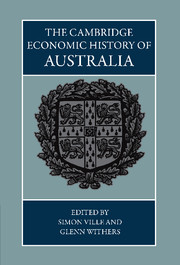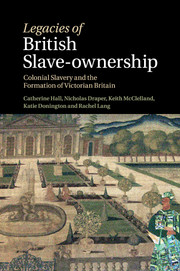Refine search
Actions for selected content:
26946 results in Economic history
BHR volume 88 issue 3 Cover and Back matter
-
- Journal:
- Business History Review / Volume 88 / Issue 3 / Autumn 2014
- Published online by Cambridge University Press:
- 31 October 2014, pp. b1-b6
- Print publication:
- Autumn 2014
-
- Article
-
- You have access
- Export citation
A Tomato for All Seasons: Innovation in American Agricultural Production, 1900–1945
-
- Journal:
- Business History Review / Volume 88 / Issue 3 / Autumn 2014
- Published online by Cambridge University Press:
- 31 October 2014, pp. 523-544
- Print publication:
- Autumn 2014
-
- Article
- Export citation
Capital as Will and Imagination: Schumpeter's Guide to the Postwar Japanese Miracle. ByMark Metzler. Ithaca: Cornell University Press, 2013. xviii + 295 pp. Appendix, notes, references, index. Cloth, $49.95. ISBN: 978-0-8014-5179-9.
-
- Journal:
- Business History Review / Volume 88 / Issue 3 / Autumn 2014
- Published online by Cambridge University Press:
- 31 October 2014, pp. 629-632
- Print publication:
- Autumn 2014
-
- Article
- Export citation
The People's Network: The Political Economy of the Telephone in the Gilded Age. ByRobert MacDougall. Philadelphia: University of Pennsylvania Press, 2014. 332 pp. Photographs, maps, illustrations, figures, notes, index. Cloth, $55.00. ISBN: 978-0-8122-4569-1.
-
- Journal:
- Business History Review / Volume 88 / Issue 3 / Autumn 2014
- Published online by Cambridge University Press:
- 31 October 2014, pp. 598-600
- Print publication:
- Autumn 2014
-
- Article
- Export citation
Dominion of Capital: The Politics of Big Business and the Crisis of the Canadian Bourgeoisie, 1914–1947. ByDon Nerbas. Toronto: University of Toronto Press, 2013. 378 pp. Photographs, notes, index. Cloth, $80.00; paper, $34.95. ISBN: cloth, 978-1-4426-4545-5; paper, 978-1-4426-1352-2.
-
- Journal:
- Business History Review / Volume 88 / Issue 3 / Autumn 2014
- Published online by Cambridge University Press:
- 31 October 2014, pp. 600-602
- Print publication:
- Autumn 2014
-
- Article
- Export citation
Derivate und Finanzstabilität: Erfahrung aus vier Jahrhunderten [Derivatives and Financial Stability: Experience from Four Centuries]. Edited byHanna Floto-Degener. Stuttgart: Franz Steiner Verlag, 2013. Institut für Bankhistorische Forschung, Bankhistorisches Archiv, Beiheft 48. 97 pp. Figures, tables. Paper, €27.00. ISBN: 978-3-515-10334-3.
-
- Journal:
- Business History Review / Volume 88 / Issue 3 / Autumn 2014
- Published online by Cambridge University Press:
- 31 October 2014, pp. 634-637
- Print publication:
- Autumn 2014
-
- Article
- Export citation
Fortune Tellers: The Story of America's First Economic Forecasters. ByWalter A. Friedman. Princeton: Princeton University Press, 2014. xi + 273 pp. Illustrations, photographs, maps, notes, index. Cloth, $29.95. ISBN: 978-0-691-15911-9.
-
- Journal:
- Business History Review / Volume 88 / Issue 3 / Autumn 2014
- Published online by Cambridge University Press:
- 31 October 2014, pp. 608-610
- Print publication:
- Autumn 2014
-
- Article
- Export citation
Shaping Globalization: London's Merchant Bankers in the Early Nineteenth Century
-
- Journal:
- Business History Review / Volume 88 / Issue 3 / Autumn 2014
- Published online by Cambridge University Press:
- 31 October 2014, pp. 469-495
- Print publication:
- Autumn 2014
-
- Article
- Export citation
Engineering Philadelphia: The Sellers Family and the Industrial Metropolis. ByDomenic Vitiello. Ithaca: Cornell University Press, 2013. xiv + 267 pp. Photographs, illustrations, maps, notes, index. Cloth, $35.00. ISBN: 978-0-8014-5011-2.
-
- Journal:
- Business History Review / Volume 88 / Issue 3 / Autumn 2014
- Published online by Cambridge University Press:
- 31 October 2014, pp. 620-622
- Print publication:
- Autumn 2014
-
- Article
- Export citation
The Good Rich and What They Cost Us. ByRobert F. Dalzell Jr. New Haven: Yale University Press, 2013. 199 pp. Illustrations, photographs, notes, index. Cloth, $28.00. ISBN: 978-0-300-17559-2.
-
- Journal:
- Business History Review / Volume 88 / Issue 3 / Autumn 2014
- Published online by Cambridge University Press:
- 31 October 2014, pp. 595-597
- Print publication:
- Autumn 2014
-
- Article
- Export citation
A Failure of Regulation? Reinterpreting the Panic of 1907
-
- Journal:
- Business History Review / Volume 88 / Issue 3 / Autumn 2014
- Published online by Cambridge University Press:
- 31 October 2014, pp. 545-569
- Print publication:
- Autumn 2014
-
- Article
- Export citation
German Merchants in the Nineteenth-Century Atlantic. ByLars Maischak. New York: Cambridge University Press, 2013. xxii + 295 pp. Maps, figures, tables, glossary, bibliography, index. Cloth, $95.00. ISBN: 978-1-107-01729-0.
-
- Journal:
- Business History Review / Volume 88 / Issue 3 / Autumn 2014
- Published online by Cambridge University Press:
- 31 October 2014, pp. 617-619
- Print publication:
- Autumn 2014
-
- Article
- Export citation
BHR volume 88 issue 3 Cover and Front matter
-
- Journal:
- Business History Review / Volume 88 / Issue 3 / Autumn 2014
- Published online by Cambridge University Press:
- 31 October 2014, pp. f1-f7
- Print publication:
- Autumn 2014
-
- Article
-
- You have access
- Export citation
Selected Abstracts from International Business History Journals
-
- Journal:
- Business History Review / Volume 88 / Issue 3 / Autumn 2014
- Published online by Cambridge University Press:
- 31 October 2014, pp. 575-581
- Print publication:
- Autumn 2014
-
- Article
-
- You have access
- Export citation
The Making of Black Detroit in the Age of Henry Ford. ByBeth Tompkins Bates. Chapel Hill: University of North Carolina Press, 2012. xiii + 343 pp. Illustrations, figures, bibliography, notes, index. Cloth, $45.00. ISBN: 978-0-8078-3564-7.
-
- Journal:
- Business History Review / Volume 88 / Issue 3 / Autumn 2014
- Published online by Cambridge University Press:
- 31 October 2014, pp. 615-617
- Print publication:
- Autumn 2014
-
- Article
- Export citation
The Great Escape: Health, Wealth, and the Origins of Inequality. ByAngus Deaton. Princeton: Princeton University Press, 2013. xvi + 360 pp. Illustrations, tables, notes, index. Cloth, $29.95. ISBN: 978-0-6911-5354-4.
-
- Journal:
- Business History Review / Volume 88 / Issue 3 / Autumn 2014
- Published online by Cambridge University Press:
- 31 October 2014, pp. 612-614
- Print publication:
- Autumn 2014
-
- Article
- Export citation
When Innovation Becomes Inefficient: Reexamining Britain's Radio Industry
-
- Journal:
- Business History Review / Volume 88 / Issue 3 / Autumn 2014
- Published online by Cambridge University Press:
- 31 October 2014, pp. 497-521
- Print publication:
- Autumn 2014
-
- Article
- Export citation
Cartel Theory and Cartel Practice: The Case of the International Aluminum Cartels, 1901–1940
-
- Journal:
- Business History Review / Volume 88 / Issue 3 / Autumn 2014
- Published online by Cambridge University Press:
- 15 September 2014, pp. 445-467
- Print publication:
- Autumn 2014
-
- Article
- Export citation

The Cambridge Economic History of Australia
-
- Published online:
- 05 September 2014
- Print publication:
- 08 October 2014

Legacies of British Slave-Ownership
- Colonial Slavery and the Formation of Victorian Britain
-
- Published online:
- 05 September 2014
- Print publication:
- 28 August 2014
